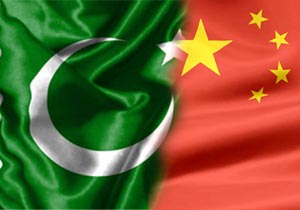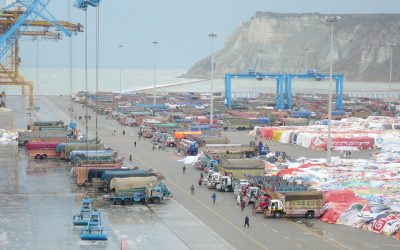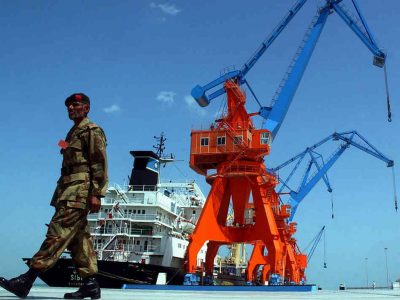Gwadar Port is ‘the largest and deepest sea port in the middle of the world’. On February 18th 2013 Pakistan transferred control of its strategically located port at Gwadar, in the Balochistan province, to China. Ninety percent of Gwadar’s business is sea to sea and does not therefore require a large road network. For China, who has long had the ambition of setting up a warm water port, Gwadar is a strategic dream come true.
China wants to set up outposts along its global energy lines to monitor and safeguard energy flows. Gwadar is situated on the Arabian Sea, just 180 nautical miles (330 kilometres) from the Strait of Hormuz, through which a third of the world’s oil supply passes. It is a prime location to monitor shipping through the Strait of Hormuz from the Persian Gulf, providing access also to cheap land routes or Middle Eastern trade through Pakistan into western China and Central Asia.
Gwadar is a deep water port built with help from Chinese money and has been run by a Singaporean company—until now. The Pakistan People’s Party (PPP)-led government signed the Gwadar agreement with China, the previous government opting in 2007 for the Port Authority of Singapore, not to upset Washington, even though China was providing 75 percent of the US$250 million cost of construction.
For China, the port agreement provides vast potential benefits. Lin Boqiang, director of Energy Economics Research centre at Xiamen University, explained: “I do believe China will build the port at the astonishing ‘Chinese speed’ to materialise the port’s strategic values.” It offers a shorter route to western China, via the recently expanded Karakoram highway across Gilgit-Baltistan in northern Pakistan, and an alternative route to vulnerable sea lanes through the Strait of Malacca. China is expected to build a naval base at Gwadar and its navy would maintain a regular presence there.
The United States sees Gwadar as part of China’s strategy of building a “String of Pearls” presence on the Indian Ocean. Gwadar is the most important and best strategically located ‘Pearl’.
Beijing has also developed Hambantota port in Sri Lanka and built a container port facility at Chittagong in Bangladesh. India fears Gwadar will soon become the Chinese navy’s key regional base, effectively cornered and encircled by China and Pakistan.
The US has always viewed the growth of Sino-Pakistan strategic ties with trepidation. It dislikes the rapidly growing power and influence of China in Asia, the US military presence in Afghanistan, Pakistan, Uzbekistan, Kyrgyzstan and Iraq seemingly aimed at containing China in Central Asia. As troops are about to be withdrawn from Afghanistan, China has speeded up the Sino-Pakistan corridor project, the port potentially being used to cap US influence in the Arabian Sea.
Once proposed rail, road and pipeline projects between China and Pakistan are complete Gwadar port will handle most of the oil imports to China. Sixty percent of China’s oil comes from the Gulf, in a short time travelling 16,000 kilometres to Shanghai. Gwadar reduces the distance to just 5000 kilometres with fewer risks. The linkage of Gwadar port with Karakoram Highway will also multiply Pakistan exports to China.
India is concerned that Gwadar can pose problems for India’s sea lines of communication, potentially worsening if the US scales down its presence in Bahrain due to economic constraints. India’s counter strategy Chabahar Port in Iran gives it access into Afghanistan, a trilateral agreement having been signed between India , Iran and Afghanistan to give Indian goods for Central Asia in addition to Afghanistan VIP treatment and tariff concessions at Chah Bahar. India is also constructing a high-tech naval base at Rambilli, west of Visakhapatnam, on its eastern coast with underground berths for nuclear weapons armed submarines.
Gwadar gives China a strategic post of observation and a key location for its navy, whose ships recently participated in a multinational exercise in the waters south of Gwadar. China has also come closer to Russia to counterbalance US interests in Asia.
Balochistan and Xinjiang are the largest, least developed and restive provinces in Pakistan and China. Beijing and Islamabad have proposed a US$18 billion China-Pakistan Economic Corridor connecting western China to South Pakistan. This will bring economic development and progress once Gwadar port is fully functional, the Pak-China Economic Corridor linking Gwadar through road and rail to Kashgar making it the shortest route for China to use for trade. Other projects being started are a 125 mile tunnel connecting both countries, a fibre optic cable connecting Rawalpindi to China and an expansion of the Karakoram Highway. In addition to these a motorway from Gwadar, Balochistan to Kasghar in Xinjiang province is planned as well as a rail link connecting the two. China has agreed to invest US$900 million to develop infrastructure projects of its own in Gwada, agreeing also to invest approximately US$ 52 billion in other major projects in Pakistan over a time period of five years.
Gwadar is located in the volatile Balochistan province where militant groups have emerged. They appealed to Washington for support and have opposed China’s building of the port at Gwadar. This insurgency was engineered to prevent Gwadar port from becoming operational and connecting China and Pakistan as an international trade corridor. The US has refused Pakistani requests for the Balochi militants to be placed on a list of terrorist organisations. Sections of the US political establishment have even raised the possibility of supporting “Balochi self-determination” to warn Islamabad not to tie itself too closely to Beijing.
The Pak-China friendship has been said to be “higher than the mountains and deeper than the oceans”, 81% of Pakistanis viewing China favourably, the highest rate of any country without a sizable ethnic Chinese population. Efforts were made by vested interests to create a rift between both countries with terrorist attacks, the kidnapping of Chinese engineers and attempting to establish links between militants in Balochistan and Xinxiang. As of now the situation in Balochistan is under control; it is peaceful and on the road to prosperity. Militants tried their utmost to engage the Pakistan army but only the police and paramilitary forces were used to counter them, the foreign strategy failing accordingly. Pakistan has to provide feasible conditions in Balochistan for the ambitious project to take off and to contend with Indo-US challenges in the region. The US and India, Saudi Arabia and UAE have been financing and training mercenaries to make the emergence of Gwadar impossible.
Once launched as a free economic zone, Gwadar would also lessen the importance and growth of Dubai. To facilitate rapid commercial and economic development, special facilities will be provided such as general tax-holidays, no VAT and generous incentives pertaining to business ownership and employment of foreign workers. The purpose of this is to accelerate economic development as well as foreign and local investments, Pakistan also providing a safe haven for Chinese investments.
It is also planned to further develop Ormara naval base and port in Balochistan once Gwadar reaches 70% functional capacity, extending considerably Pakistan’s sea control. Karachi has been quite unsuitable as a naval port as its shallow approaches require a long entrance channel which is easily susceptible to mining. The Pakistan navy has to share it with the commercial navy which made a suitable alternative to Karachi implicitly necessary.
Gwadar is destined to be the largest business centre of the world. China and the Far East are on the extreme right side and can use Gwadar to send goods to the rest of the world. In the 21st century, maritime security along with trade and development are both necessary through effective sea lanes as sea power is now of the greatest importance.
Lawyer by education, writer and observer at large.
I write on Pakistan-centric and geopolitical matters to highlight Pakistan and its real potential vis a vis this region. This is my contribution for my country
@Sabena_Siddiqi on Twitter





Good Article. It highlights how good economics is being overshowded by geopolitics...One thing of note which one fails to understand is that Gawader is totally a commercial port with commercial operators such as port authoroity of Singapore earlier managing ti and now China Overseas Port Authority on commercial basis .It is not as this is run by Chinese Goverment or military. Same way Dubai Port Authority is running ports around Africa such as in Eygpt on commercial basis and there is no hue and cry about it